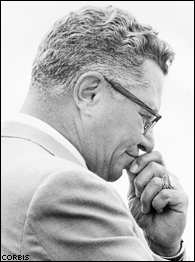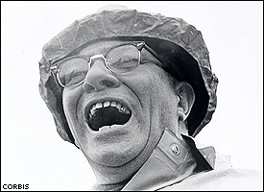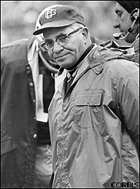| | By Mike Puma
Special to ESPN.com
"He gets up in my face, about six inches from my nose and gives me the concentration lecture as in, 'The concentration period of a college student is five minutes, in high school it's three minutes, in kindergarten it's 30 seconds. And you don't even have that, mister. So where does that put you?' " former Packers star guard Jerry Kramer says about Vince Lombardi on ESPN Classic's SportsCentury series.
The profile on Lombardi, who won five world titles in his nine seasons with Green Bay, will air Sept. 16 at 5 a.m ET and Sept. 17 at 3 a.m. ET.
When he was named head coach and general manager of the Green Bay Packers in 1959, Vince Lombardi made it known that he had never been associated with losing teams. He vowed this trend would continue. This was tough talk considering Lombardi had taken over a laughingstock, a franchise that had just gone 1-10-1, its ninth losing season in 11 years.
But Lombardi's words proved prophetic. |  | | Lombardi's Packers won the first two Super Bowls. |
Not only did the losing stop - the Packers went 7-5 in Lombardi's first season - Green Bay soon became known as Titletown, USA. At the center of the Packers' five championships in seven seasons was Lombardi, a disciplinarian who demanded perfection while admitting that perfection was unattainable.
Along the way, the 5-foot-9, 210-pound Lombardi became something of a mythological figure. He is remembered almost as much for one quotation as for molding the Packers dynasty. "Winning isn't everything, it's the only thing," became synonymous with the name Vince Lombardi.
Yet Lombardi wasn't the first to make that statement. What's more, he regretted saying it. He disliked being perceived as a win-at-all-costs coach. Instead, he hoped to convey the message that preparation and the will to win were the essence of football and, to some extent, life.
"Winning is not a sometime thing, it is an all-the-time thing," Lombardi
often told his players.
The Pack got the point. In Lombardi's nine seasons, the team went 98-30-4, including 9-1 in the postseason. Among the five championships was a stretch of three straight from 1965-67. No team has matched that streak since. "He was always raising the bar," quarterback Bart Starr said.
A strong believer that everybody had ability, Lombardi preached that pride in performance made the difference. |  | | Lombardi's Packers went 7-5 in his first year. |
And such pride, he said, was developed from a winning tradition.
Not everybody had a cordial relationship with Lombardi. But most agreed that the coach was fair. One of the running jokes with the Packers in the 1960s was "Lombardi treats us all the same - like dogs."
In the Lombardi trinity, God, family and the Green Bay Packers were what mattered. Lombardi, who attended daily mass and raised two children with his wife Marie, tried to find a balance among the trinity's three components.
He was born on June 11, 1913 in Brooklyn, N.Y. His earliest inclination was to study for the Catholic priesthood, but he dismissed the idea during high school.
Growing up, Lombardi was surrounded by a large extended family in Brooklyn. His mother Matilda was one of 13 children, and most of the siblings lived within a mile radius of one another. Lombardi's father Harry was a butcher and meat wholesaler on the Hudson River waterfront.
In 1933, Lombardi accepted a football scholarship at Fordham. After spending three seasons as a backup lineman, Lombardi started as a senior, rising to minor fame in 1936 as a member of the "Seven Blocks of Granite," a nickname given to Fordham's fearsome line, a unit largely responsible for bringing the Rams to the cusp of the Rose Bowl.
He graduated and then dabbled with semipro football. Then he spent a semester in law school. His coaching career began in 1939, when he became an assistant football coach at St. Cecilia, a small Catholic high school in Englewood, N.J. Lombardi was promoted to head coach at St. Cecilia in 1942, leading the team to a 32-game unbeaten streak, including 25 consecutive victories, in one stretch. He also taught Latin, physics and chemistry at the school.
He returned to Fordham as an assistant coach in 1947, and stayed for two seasons. At the time, Lombardi's career goals were modest: to be Fordham's head coach. But when he was turned down for the job in 1949, he headed up the Hudson River to West Point.
Lombardi spent five years at Army as an assistant to Red Blaik and came to regard Blaik as the single greatest influence on his coaching career. Perhaps the biggest lesson he learned from Blaik was the importance of preparation.
Blaik was one of the earliest coaches to study game film. The task of
dissecting much of that film was given to Lombardi, who developed a
knack for finding a team's weakness. He also learned from Blaik the value of simplicity; game plans and terminology were kept basic.
Lombardi's NFL coaching career began in 1954 as an offensive assistant with the New York Giants. Also on that staff under head coach Jim Lee Howell was a young defensive assistant named Tom Landry, who later became head coach of the Dallas Cowboys.
With Lombardi diagramming plays for an offense that revolved around halfback Frank Gifford's talents, the Giants won the championship in 1956. Two years later, they lost the title game to the Colts in the NFL's first sudden-death overtime game.
Lombardi, who had turned down an opportunity to become head coach of the Philadelphia Eagles before the 1958 season, couldn't say no to the Packers in early 1959 when they offered him the dual jobs of head coach and general manager.
Known mostly as an offensive innovator, Lombardi developed the "Packer Sweep," a play that became the cornerstone on which his offense was built. The sweep called for a running back to follow his pulling guards. Lombardi had his team practice this play to the point the players could run it successfully even when the opposition knew it was coming.
In his second season (1960), the Packers won the Western Conference with an 8-4 record, but lost 17-13 to the Eagles in the championship game. Afterwards, Lombardi said that his team would never lose another title game. He was right.
|  | | Lombardi coached the Packers to back to back NFL titles in 1961-2. |
The Packers won championships the next two years, and after finishing second in the West in 1963 and 1964, began their streak of three straight championships. The 1961 and 1962 title-game victories (37-0 and 16-7) were especially sweet for Lombardi because they came against his former employer, the Giants.
In the 1965 championship game, the Packers held Jim Brown to 50 yards and rolled to a 23-12 victory over the Cleveland Browns. Then came crushing victories over the Kansas City Chiefs, 35-10, and Oakland Raiders, 33-14, in the first two Super Bowls. But the real drama in those last two seasons came in the NFL title games.
Tom Brown's end-zone interception of Dallas quarterback Don Meredith's pass with less than half a minute remaining gave the Pack the 1966 NFL title, 34-27. A season later, in what became known as the Ice Bowl - the temperature at Lambeau Field plunged to minus 15 degrees - the Packers trailed 17-14 and had the ball on the Cowboys' one with 16 seconds left. Lombardi rejected a field goal. Starr sneaked into the end zone to give the Packers a 21-17 victory.
Following the Super Bowl win over the Raiders, Lombardi announced he was retiring from coaching, but would remain in Green Bay as general manager. But he grew bored with office work. After watching the Packers fall to 6-7-1 in 1968, Lombardi resigned to become head coach, general manager and part-owner of the Washington Redskins.
Again faced with the task of resurrecting a perennial loser, Lombardi found success. The Redskins went 7-5-2 in 1969 for their first winning season in 14 years.
Lombardi, though, never got a chance to complete his mission. Before the following season started, he was diagnosed with colon cancer. He died on Sept. 3, 1970. He was 57.
The Lombardi legend shines just as bright three decades after his death as it did when he was leading the Packers' dynasty. He knew what it took to succeed. "The difference between men," Lombardi said, "is in energy, in the strong will, in the settled purpose and in the invincible determination."
And few have had that invincible determination more than the man many consider the greatest coach of the 20th century.
| |
ALSO SEE
Lombardi notes
Quotes by Vince Lombardi
|



